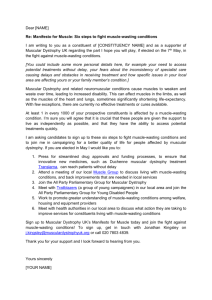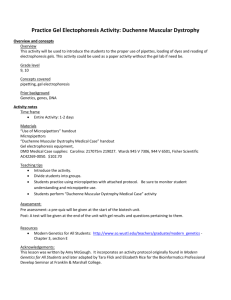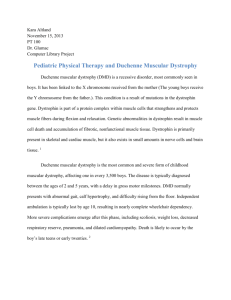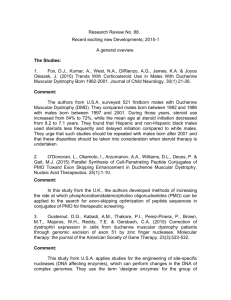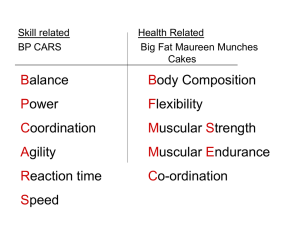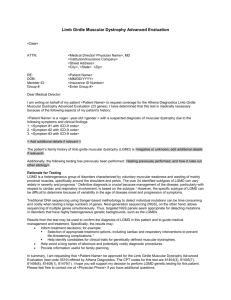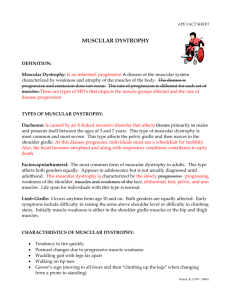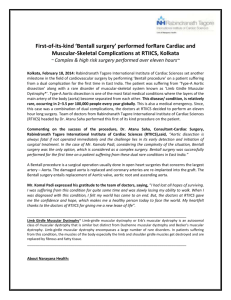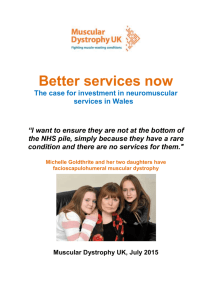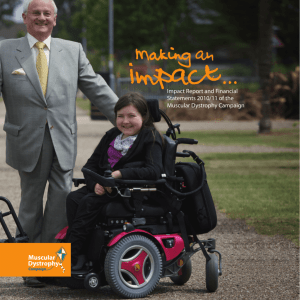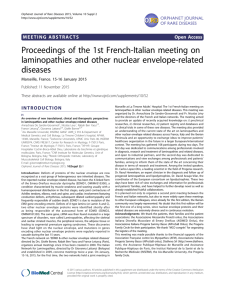Press release – Lack of emotional support at point of diagnosis
advertisement
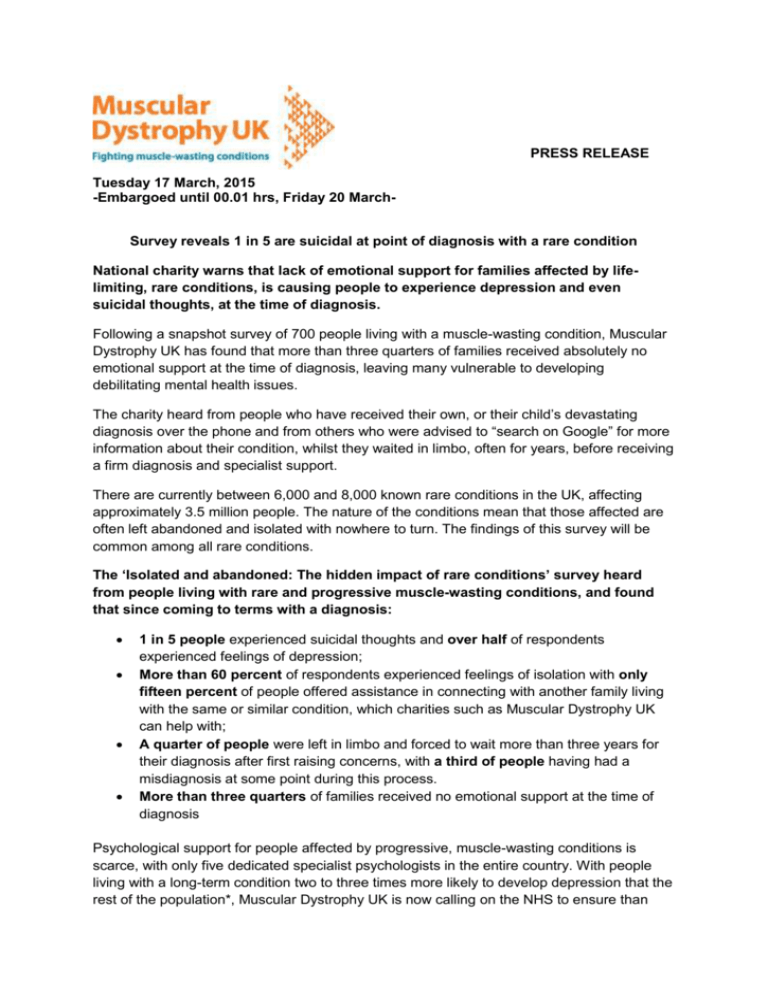
PRESS RELEASE Tuesday 17 March, 2015 -Embargoed until 00.01 hrs, Friday 20 MarchSurvey reveals 1 in 5 are suicidal at point of diagnosis with a rare condition National charity warns that lack of emotional support for families affected by lifelimiting, rare conditions, is causing people to experience depression and even suicidal thoughts, at the time of diagnosis. Following a snapshot survey of 700 people living with a muscle-wasting condition, Muscular Dystrophy UK has found that more than three quarters of families received absolutely no emotional support at the time of diagnosis, leaving many vulnerable to developing debilitating mental health issues. The charity heard from people who have received their own, or their child’s devastating diagnosis over the phone and from others who were advised to “search on Google” for more information about their condition, whilst they waited in limbo, often for years, before receiving a firm diagnosis and specialist support. There are currently between 6,000 and 8,000 known rare conditions in the UK, affecting approximately 3.5 million people. The nature of the conditions mean that those affected are often left abandoned and isolated with nowhere to turn. The findings of this survey will be common among all rare conditions. The ‘Isolated and abandoned: The hidden impact of rare conditions’ survey heard from people living with rare and progressive muscle-wasting conditions, and found that since coming to terms with a diagnosis: 1 in 5 people experienced suicidal thoughts and over half of respondents experienced feelings of depression; More than 60 percent of respondents experienced feelings of isolation with only fifteen percent of people offered assistance in connecting with another family living with the same or similar condition, which charities such as Muscular Dystrophy UK can help with; A quarter of people were left in limbo and forced to wait more than three years for their diagnosis after first raising concerns, with a third of people having had a misdiagnosis at some point during this process. More than three quarters of families received no emotional support at the time of diagnosis Psychological support for people affected by progressive, muscle-wasting conditions is scarce, with only five dedicated specialist psychologists in the entire country. With people living with a long-term condition two to three times more likely to develop depression that the rest of the population*, Muscular Dystrophy UK is now calling on the NHS to ensure than every individual or family diagnosed at a muscle centre or clinic can access support from a psychologist; ideally one with neuromuscular expertise. The charity also want to see more health professionals sign-posting to charities to help people get the emotional and practical support that they need. Rachel Halpin from Formby, Liverpool has a son Harry, 3, who was diagnosed with the life-shortening muscle-wasting condition, Duchenne muscular dystrophy in 2013. “It was agonising waiting for blood test results. I was taken into a side-room with my mum and something felt wrong. We were then told that my precious boy had Duchenne. I never in my wildest imagination expected to hear that. It was horrific. My mouth went completely dry and my head felt like it was spinning. Harry was just there playing. It was so surreal, I couldn’t believe it. I rang up my husband, I could barely get my words out, or even pronounce Duchenne. I’d never heard of it before. “Gareth and I couldn’t work for weeks, we were in turmoil. We couldn’t sleep, we felt physically sick. We tried to tell our friends but we just couldn’t face it. They were the longest days of my life and, I’m not sure how we got through it.” Sarah Bennett from Birmingham, has a daughter Abbi, 7, who was diagnosed with Ullrich congenital muscular dystrophy in 2010. She said: “The moment of diagnosis was the worst moment of my entire existence. After I was told the news and given some basic information, I left the room, got into my car and broke down. I went to pick my husband Gary up from work and he took one look at my face and thought someone had died. Gary and I were completely devastated by the news. Especially when we got home and started googling Abbi’s condition and reading comments about early death. I immediately blamed myself for not having the ‘perfect’ baby. You start asking yourself all sorts of questions: what is this going to mean for the future and what quality of life will Abbi have? Is she going to have children? Is she going to get married? All of the things we take for granted really. We try our hardest not to think about the long term. “We take each day at time, but there are moments where we both have wobbles. Particularly now, as Abbi is getting older, and she’s asking more and more searching questions about her condition. As parents, Gary and I can sometimes feel helpless because we don’t know how to answer these difficult questions. We’ve tried to be upbeat and positive about it all. If it wasn’t for getting in contact with Muscular Dystrophy UK and meeting other families, I don’t know what we would have done. We have gained so much support and strength through connecting with the charity and families affected by Abbi’s condition. I can't emphasise enough how pivotal that was in terms of us feeling less isolated.” Dr Sadie Thomas-Unsworth, a specialist clinical psychologist who supports children and adults in the South West of England, said: “This is often a world in which many of people’s hopes and dreams for the future have suddenly been called into question. Timely psychological support can help individuals to find a way of living a full life again, in spite of their condition by providing a safe space to talk through difficult feelings, whilst supporting them to identify what really matters to them and be able to think about how they can still achieve their goals.” Robert Meadowcroft, Chief Executive of Muscular Dystrophy UK, said: “The evidence is clear. Too many families have been left abandoned and alone to cope with what can be a bombshell at diagnosis. This void of emotional support is having a detrimental impact on people’s lives, their mental health and in the worst cases, we’ve even heard from people who have had thoughts of taking their own life. “Families are not being given the right information about charities and others that can help with the feelings of isolation. We need to recognise the emotional impact of rare conditions and provide support to these families at a very vulnerable time. This is why we are calling for a joined up approach between the UK Government’s rare disease strategy and the mental health and suicide strategies, to make sure that no individual or family living with life-limiting, rare and progressive condition falls through the emotional safety net. “We also need to ensure that the right psychological support is in place for people affected and their families, from day one. The NHS must do better in prioritising emotional support for people affected by rare conditions, as a matter of urgency.” Muscular Dystrophy UK will feature on BBC One’s Lifeline Appeal on 22 March 4.45pm. Our appeal will be presented by charity President, Sue Barker, and will tell the stories of two people living with muscle-wasting conditions, seven-year-old Abbi Bennett from Birmingham, and 28-year-old Jonathan Gilmour, who is based at Cambridge University. For anyone affected by a muscle-wasting conditions please visit www.musculardystrophyuk.org or call Muscular Dystrophy UK’s helpline on 0800 652 6352 (Freephone). For anyone struggling to cope or feeling suicidal please contact Samaritans on 08457 909090 or email jo@samaritans.org ENDS For more information about the work of Muscular Dystrophy UK please contact the Press Team: pressoffice@musculardystrophyuk.org, 020 7803 4832. Notes to Editors: *Mental Health Network, NHS Confederation - Investing in emotional and psychological wellbeing for patients with long-term conditions We have a wealth of case studies available for interview Muscular Dystrophy UK Muscular Dystrophy UK is the charity for 70,000 people living with muscle-wasting conditions. We make a difference today, by providing vital information and support to help people live independently. We make a difference for tomorrow, by accelerating progress in research and driving the campaign for access to emerging treatments.
